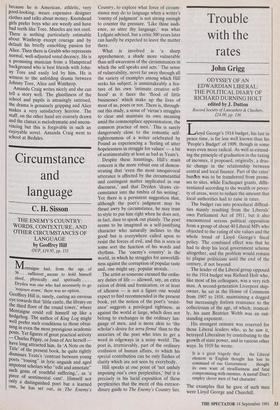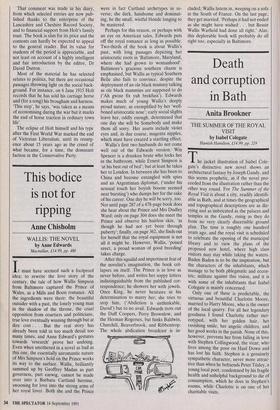Trouble with the rates
John Grigg
ODYSSEY OF AN EDWARDIAN LIBERAL: THE POLITICAL DIARY OF RICHARD DURNING HOLT edited by J. Dutton
Rocord Society of Lancashire & Cheshire, £24.00, pp. 136
Lloyd George's 1914 budget, his last in peace time, is far less well known than his `People's Budget' of 1909, though in some ways even more radical. As well as extend- ing the principle of graduation in the taxing of incomes, it proposed, originally, a dras- tic change in the relationship between central and local finance. Part of the rates' burden was to be transferred from premi- ses to sites, while Exchequer grants, diffe- rentiated according to the wealth or pover- ty of areas, were to reduce the amount that local authorities had to raise in rates.
The budget ran into procedural difficul- ties mainly resulting from the Liberals' own Parliament Act of 1911, but it also encountered serious political opposition from a group of about 40 Liberal MPs who objected to the rating of site values and the whole trend of Lloyd George's fiscal policy. The combined effect was that he had to drop his local government scheme altogether, and the problem would remain to plague politicians until the end of the century, if not beyond.
The leader of the Liberal group opposed to the 1914 budget was Richard Holt who, like most of his colleagues, was a very rich man. A second-generation Liverpool ship- owner, he sat in the House of Commons from 1907 to 1918, maintaining a dogged but increasingly forlorn resistance to the collectivism of the age, of which, ironical- ly, his aunt Beatrice Webb was an out- standing exponent.
His strongest censure was reserved for those Liberal leaders who, as he saw it, betrayed Liberalism by contributing to the growth of state power, and in various other ways. In 1919 he wrote:
It is a great tragedy that . . the Liberal element in English thought has lost its command of our Government . . . thought its own want of steadfastness and fatal compromising with enemies. A moral! Don't employ clever men of bad character.
The examples that he gave of such men were Lloyd George and Churchill. That comment was made in his diary, from which selected entries are now pub- lished thanks to the enterprise of the Lancashire and Cheshire Record Society, and to financial support from Holt's family trust. The book is slim for its price and the contents can hardly be expected to appeal to the general reader. But its value for students of the period is appreciable, and not least on account of a highly intelligent and fair introduction by the editor, Dr David Dutton.
Most of the material he has selected relates to politics, but there are occasional passages throwing light on the social back- ground. For instance, on 6 June 1915 Holt records that he has sold his carriage horse and (for a song) his brougham and harness. `This step', he says, 'was taken as a means of economising during the war but it marks the end of horse traction in ordinary town life'.
The eclipse of Holt himself and his type after the First World War marked the end of Victorian Liberalism, until its resurg- ence about 15 years ago as the creed of what became, for a time, the dominant faction in the Conservative Party.



















































 Previous page
Previous page